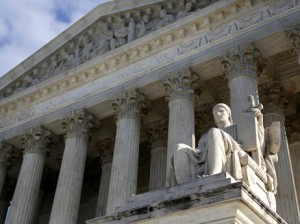
– Jonathan Ernst/Reuters/Landov photo
‘Most important labor case in the past 20 years’
By TIM ROWDEN
Editor
In what St. Louis labor attorney Chris Grant said may be “the most important labor case in the past 20 years,” the U.S. Supreme Court heard arguments recently in Harris vs. Quinn, a case out of Illinois concerning in-home care providers who work with Medicaid patients, and their right to unionize.
The home services program in Illinois has about 28,000 home care aides working in homes all over the state. There isn’t a centralized workplace, and the goal for the state is creating and retaining a professional group of home care aides to meet the needs of what is an ever increasing population of older people with disabilities.”
Prior to the state recognizing the Service Employees International Union (SEIU) in Illinois, turnover was huge, leaving large gaps in coverage for disabled adults. In the 10 years since unionization, however, wages have nearly doubled, from $7 to $13 an hour; training and supervision has increased, as well as standardization of qualifications. Workers now have health insurance and retention has greatly increased.
What may surprise many is that this arrangement is cheaper, according to Illinois Attorney General Lisa Madigan, with savings of $632 million.
Regardless of the savings, and ignoring the other benefits for union and non-union workers alike, lawyers for the anti-union National Right to Work Foundation, representing three non-union members, brought suit against SEIU and Democratic Governor Pat Quinn.
WHAT’S AT STAKE
There are two issues in Harris, says Sherrie Hall, a union-side labor law, employment law, and employee benefits law attorney with the firm Hammond and Shinners, P.C., exclusive representation and whether non-union members must pay a fair share for negotiating a contract they benefit from.

“ An adverse determination on either would chip away at the bargaining power of unions,” Hall said.
“An adverse decision on the issue of exclusive representation would encourage factions among the employees who otherwise share a community of interest, with the result that the single ‘bargaining unit’ might be represented by two or more organizations. This in turn would permit the employer to pit the organizations against each other. Because the parties wouldn’t necessarily have the same interests, the power of each would be substantially diluted.
“An adverse decision on the issue of fair share payments while maintaining exclusivity would encourage free loaders, in much the same way that right-to-work encourages it in the private sector.”
When a union is the exclusive representative of the bargaining unit it must fairly represent all employees in the unit, whether or not they are dues-paying members, Hall said. Free loaders weaken the bargaining power because they weaken the union’s economic resources. An employer, therefore, can bully the union knowing that it has deeper pockets and the union cannot afford to take on most of the issues.
Moreover, Hall said, free loaders create dissension amongst the bargaining unit, because dues-paying members resent that the free loaders get the benefits of the union contract without paying their fair share.
IMPORTANT CASE

“It’s a very important case, maybe the most important labor case in the past 20 years at the US Supreme Court,” said Grant, an attorney specializing in labor, wage and hour, prevailing wage, and employment discrimination law with the firm Schuchat, Cook & Werner.
“If you buy what the plaintiffs are seeking to do it could have a monumental effect on the ability of a union to charge employees a fair share for the services that they provide,” Grant said. “Essentially the plaintiffs are seeking a finding, in the public sector at least, that right-to-work is Constitutionally compelled, contrary to 40 years of Supreme Court precedent.”
TROUBLING PATTERN IN RECENT RULINGS
Recent rulings by this Court could spell trouble in Harris vs. Quinn.
In June of 2012, writing for himself and his fellow conservatives in Knox v. SEIU, Justice Samuel Alito labeled fair share or agency fees “a ‘significant impingement on First Amendment rights.’”
Though the conservative justices decided not to revise the Court’s past decisions permitting agency fees in Knox, it’s possibly – maybe even likely –they will decide otherwise in Harris now that this issue is directly before them.
Under Chief Justice John Roberts’ leadership, the Supreme Court largely wrote a key protection for victims of sexual or racial harassment out of the law, made it easier for employers to retaliate against workers who file civil rights complaints, and employers an easy way to immunize themselves from class action lawsuits brought by their workers.
“It’s an activist court,” Grant said, “despite what Republians say about judicial activism. This Court is not opposed to use certain principles to restrict the ability of unions or employees and employers to enter into agreements.”
(Some information from this story from Ian Millhiser of Think Progress and Nina Totenberg of National Public Radio.)

